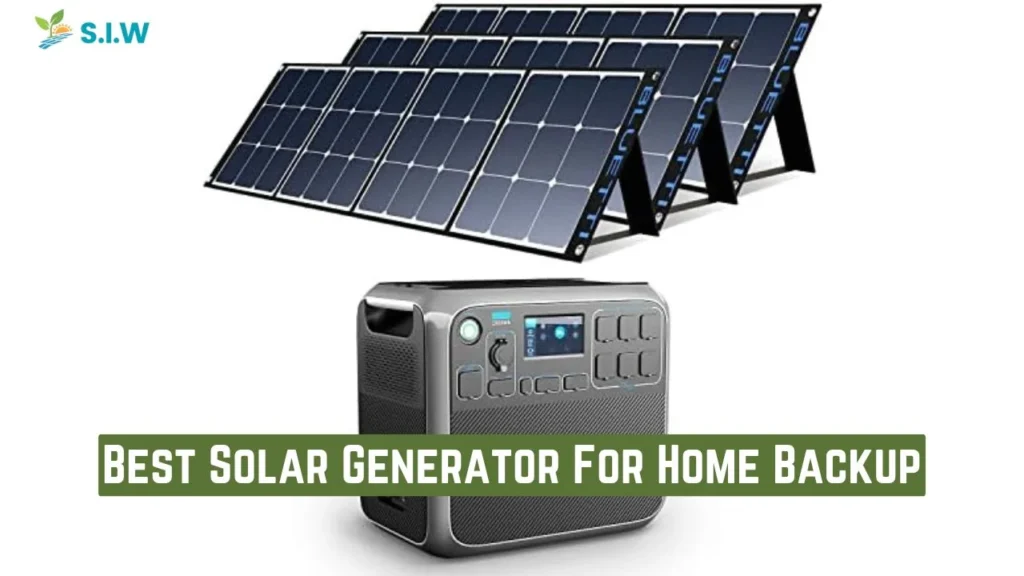In today’s world, power outages are becoming increasingly frequent due to unpredictable weather, aging power grids, and natural disasters. To stay prepared, many homeowners are turning to solar generators for backup power. These devices offer a cleaner and quieter alternative to gas-powered generators. Below, we provide an in-depth guide to the best solar generators for home backup, covering top models, essential features, and expert advice.
What is a Solar Generator?
A solar generator is a portable power station that stores energy in a built-in battery and gets recharged using solar panels. Unlike conventional generators, solar models do not emit harmful gases or require fuel. They are eco-friendly and silent, making them perfect for both indoor and outdoor use.
Key Features to Look for in a Solar Generator
When choosing the best solar generator for your home, consider the following essential features:
Battery Capacity and Output (Watt-hours and Watts)
- Battery capacity indicates how much energy the generator can store, measured in watt-hours (Wh).
- Look for a generator with at least 1,000 Wh if you need to power essential devices like refrigerators, medical equipment, or lighting during an outage.
- The output wattage shows how much power the generator can deliver at a time. If you need to run large appliances, ensure the model can handle at least 1,500 watts of continuous output.
Solar Charging Efficiency
- Faster charging times are critical for long outages. A system with MPPT (Maximum Power Point Tracking) controllers charges more efficiently, even in cloudy conditions.
- Some models offer expandable solar arrays for quicker recharging by connecting multiple solar panels.
Portability and Weight
- Depending on where you plan to use it, portability might be a factor. Look for lightweight models if you need something that is easy to move around. Wheels and handles can also help with transportation.
Inverter Quality
- Pure sine wave inverters deliver smoother power suitable for sensitive electronics, while cheaper modified sine wave inverters might cause glitches in certain devices.
Battery Type: Lithium vs. Lead-Acid
- Lithium-ion batteries are lighter and offer a longer lifespan but tend to be more expensive.
- Lead-acid batteries are heavier and cheaper but have a shorter cycle life, making them less ideal for frequent use.
Top Solar Generators for Home Backup in 2024
1. EcoFlow Delta Pro
The EcoFlow Delta Pro is one of the most powerful solar generators on the market today, boasting a capacity of 3,600 Wh with a peak output of 4,500 watts.
- Key Features: Expandable battery capacity, Wi-Fi-enabled controls, and fast solar recharge.
- Best For: Large homes requiring power for multiple appliances and devices.
2. Jackery Explorer 2000 Pro
The Jackery Explorer 2000 Pro offers 2,160 Wh of capacity, making it perfect for medium-sized households. It supports solar panels for recharging in 6 hours under optimal sunlight conditions.
- Key Features: Portable design, quiet operation, and LCD screen to monitor performance.
- Best For: Homes needing moderate power for refrigerators, TVs, and laptops.
3. Bluetti AC200P
With a capacity of 2,000 Wh and a continuous output of 2,000 watts, the Bluetti AC200P is highly versatile. It features multiple output ports, including USB, AC, and DC, and is ideal for both indoor and outdoor use.
- Key Features: Solar recharge in 3.5 hours, built-in LCD display, and expandable battery options.
- Best For: Homeowners looking for a balance between power and portability.
4. Goal Zero Yeti 1500X
Designed for ease of use, the Goal Zero Yeti 1500X offers 1,516 Wh of capacity with an intuitive interface and app control. It supports multiple devices at once, including refrigerators, fans, and CPAP machines.
- Key Features: Expandable battery pack and fast solar recharge using Yeti solar panels.
- Best For: Families needing reliable backup for emergencies.
Advantages of Using a Solar Generator for Home Backup
- Eco-Friendly Solution: Unlike gas generators, solar models do not emit carbon emissions, making them environmentally sustainable.
- Noise-Free Operation: Solar generators are silent, ensuring peace and comfort during outages.
- Low Maintenance: With fewer moving parts, solar generators require minimal maintenance compared to gas-powered alternatives.
- Renewable Energy Source: As long as there’s sunlight, you can keep recharging your generator indefinitely.
How to Use a Solar Generator for Home Backup Efficiently
- Prioritize Essential Devices: In emergencies, power only the most critical appliances like medical equipment, refrigerators, or lights.
- Monitor Battery Levels: Keep an eye on battery levels during usage and charge as soon as sunlight becomes available.
- Expand Capacity If Needed: Many generators support extra battery packs or multiple solar panels for extended use.
Common Applications for Solar Generators
- Emergency Power During Outages: Keep your essential devices running when the grid is down.
- Outdoor Adventures and Camping: Power portable stoves, fans, or speakers without relying on traditional generators.
- Medical Equipment Backup: Ensure continuous operation of CPAP machines, oxygen concentrators, or insulin coolers.
- Remote Work Solutions: Power laptops, routers, and phones during blackouts to maintain productivity.
FAQs
How long will a solar generator last during an outage?
The duration depends on the generator’s battery capacity and the load it’s powering. For example, a 1,500 Wh generator can power a fridge for about 12-24 hours.
Can I run my whole house on a solar generator?
Most solar generators are designed for partial home backup. To power an entire home, you may need multiple generators or a larger solar power system with an inverter.
How long does it take to charge a solar generator?
Charging times vary depending on the solar panel wattage and weather conditions. On average, it takes 6-8 hours to fully charge with 400W panels under ideal sunlight.
Are solar generators better than gas generators?
Solar generators are safer and more environmentally friendly but have limited power capacity compared to gas generators. They are ideal for indoor use and emergency power for essential devices.








